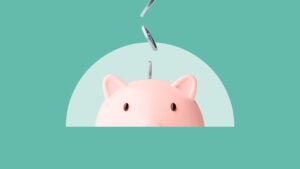Young people surprisingly feel the most optimistic about their money. Their finances sometimes tell a different story.

It started as a simple careers project for Camille McCallum. Back at her Mississippi high school, her English teacher tasked her class with asking each other what their parents did for a living, hoping it could spark their own professional interests.
Instead, McCallum — a child of the 2008 financial crisis who grew up with Dave Ramsey always on in the background and watched her parents worry about their investments and debts — quickly discovered that one’s career can be a taxonomy for wealth, akin to a sorting hat that determines whether one ascends to the upper echelons of economic classes or remains in the lower tiers.
“The rich people were doctors and lawyers, and the poor people worked at factories, but I understood that people who owned businesses tended to do well,” says McCallum, now 30. “I was always very conscious of money and not wanting to be like my parents, who always worried about money. For the boomer generation, there was very much a prescriptive formula for how to be successful. You get a good job, you stay at that job, you raise a family, you buy a house. I think people my age want more for themselves. They see the opportunity to create.”
On Jan. 31, McCallum officially made that aspiration a reality, quitting her 9-to-5 job as a teacher to operate her clothing and philanthropy company, Black Woman On A Mission, full time. She’s tripled her salary — and thanks to being able to now support herself, she’s feeling more optimistic about her finances than ever, she says.
“It feels like the world is my oyster and my financial safety, security or abundance is dependent on me,” McCallum says. “I feel like I have infinite more potential, more limitless possibilities, more opportunity to make money, versus when I was at my 9-to-5.”

Americans’ distaste for the recent U.S. economy — sentiments economists have considered ironic as the unemployment rate holds at the lowest levels in half a century — became the zeitgeist of 2023. Young people were among those thought to possess the most financial apathy, thanks to massive student loan debt, two devastating back-to-back recessions and housing unaffordability. The coronavirus pandemic also transformed the way Americans feel about their lives and careers.
But recent Bankrate data suggests the trepidation might not be so universal to the economy’s up-and-comers. Young people, like McCallum, are the ones feeling more optimistic about the path ahead. Nearly half of millennials (49 percent for those between the ages of 28-43) and almost 6 in 10 Generation Zers (58 percent of those ages 18-27) thought that their personal financial situation would get better in 2024 compared to the previous year, a Bankrate survey published in December found. That compares with just a third of Gen Xers (33 percent for those ages 44-59) and a fifth of baby boomers (20 percent ages 60-78).
Meanwhile, about 2 in 5 Gen Zers (37 percent) say that their overall financial situation has improved in the three years since November 2020, the only generation more likely to say that their finances have gotten better rather than worse, according to a Bankrate poll published in November. They were roughly two times more likely than Gen Xers and baby boomers to report improvement, at 19 percent and 15 percent, respectively. Yet, even millennials (25 percent) were more likely than their older counterparts to say that their finances had improved over the three-year period.
The youngest workers in our society will always be among the most upwardly mobile, particularly when they possess the skills needed in the workforce when the economy is performing reasonably well.— Mark Hamrick, Bankrate Senior Economic Analyst
Today’s young adults found a booming job market post-pandemic
Central to the optimism young Americans feel is a red-hot job market, economists say, which benefited early-career adults in particular as their wages climbed at a faster pace than other workers.
At the height of the post-pandemic labor market boom, the youngest workers’ wages jumped more than twice as fast as those at the opposite end of the spectrum (13 percent for those between the ages of 16-24 versus 4 percent for those ages 55 and up), according to the Federal Reserve Bank of Atlanta’s Wage Growth Tracker. Even today, as the hiring blitz slowly cools from a rapid boil to a low simmer, the youngest workers are still seeing their wages climb more quickly (9 percent versus 4 percent for those 55 and up).
“Young people always see their wages rise the fastest,” says Chris Clarke, assistant professor at Washington State University’s School of Economic Sciences. “They’re at the early point in their careers. They get a job at the entry level and move up the ladder within five years. But even considering that, wages have risen even faster for young people than historic normals.”
Indeed, the juggernaut of a U.S. job market was the predominant reason young Americans felt that prosperity in Bankrate’s survey. To be sure, young people were more likely to say their finances have improved in all aspects since November 2020, such as their short-term savings and their investments. Yet, about 2 in 5 Gen Zers (39 percent) and more than a third of millennials (35 percent) say their careers have gotten better since November 2020, the most likely facet of their finances to improve. That’s a sentiment shared by just 16 percent of Gen Xers and 7 percent of baby boomers.
It’s likely because employed Gen Zers and millennials (at 75 percent and 67 percent, respectively) were more likely to receive a pay increase in the past 12 months through October 2023, either by finding a better-paying job or getting a raise, a separate Bankrate survey published in November found. That compares with 60 percent of their Gen X counterparts and 53 percent of baby boomer workers. Those younger workers who got a pay increase were also more likely to say that their incomes kept pace with inflation, at 47 percent for Gen Z and 43 percent of millennials, versus 27 percent of Gen X and 24 percent of baby boomers.
Young Americans cite rising income — almost neck-and-neck with better spending habits — as one of the predominant reasons they expect their finances to improve this year. And they expect the good times to keep rolling. Getting a higher-paying job or additional source of income is also the top 2024 financial goal for both Gen Zers and millennials, at 25 percent and 19 percent, respectively.
“Having an unemployment rate this low means that all of these barriers to try and find a job are way lower than they used to be,” Clarke says. “Employers are hiring young people and promoting them and giving them benefits and cushions in a way that we have just not seen in 40 years.”
Young people have always tended to be more optimistic, this expert says
Rod Griffin, senior director of public education and advocacy at Experian, has long noticed that younger generations tend to be more optimistic. A Gen Xer, Griffin has a 22-year-old granddaughter and has also worked in financial services for 27 years.
“Youthful optimism is a wonderful thing,” he says. “There are times in life where it seems difficult. Especially if you’re raising children and buying a home, there always seems to be more expenses than income. But when you’re young, there’s nothing but the future in front of you. You want it to be as positive and as powerful as it can be.”
He believes it could be different this time. Through his granddaughter, Griffin has noticed that her generation is more engaged with personal finance than others were at the same age. They’re following personal finance creators on social media, reading about investing on the internet and talking about money in ways they never did before.
About 2 in 5 Gen Z and millennials (at 38 percent combined) say they feel that they have a harder time building wealth than their parents did at their age due to the economy, another Bankrate poll published in January found. For many of them, the feeling has lit a fire. Almost 3 in 10 (28 percent) of them say they’re either considering or have already pursued different means of growing their wealth from what their parents did at their age thanks to the economic environment, including investing more and pursuing career advancement.
“They have plans, they have goals, and they are very open and assertive about driving forward,” Griffin says. “There are ebbs and flows in the economy. That’s the nature of money, but I think they will maintain that optimism over time on the whole.”
Another undeniable factor, young people are more likely to have financial support from parents or relatives. The share of adults between the ages of 25-34 living at home ballooned to 8 million during the pandemic, Census Bureau data shows. That number edged down to 7.2 million in 2023 but is still among the highest levels ever recorded, representing an increase of 80 percent since 2003.
“It can be the case that the youngest individuals have some flexibility with their personal finances due to support from their parents as well as less exposure to home ownership, which can lead to costly, sudden expenses,” Hamrick says. “A downside is home ownership is a primary means of wealth creation.”
How this 20-something has already saved over $100,000
Lillian Zhang, 23, grew interested in personal finance when she started making her own money during her college internships. Finding that the suite of mobile apps and budget trackers out there often fell short, she decided to create her own Excel spreadsheet to measure her net worth — one that she also now sells online through her social media platform.
The habit has paid off.
“I’m the type of person to literally track it every day; I’m very Type A,” she says. “I watched a lot of videos where they said, ‘Once you save your first $100,000, it becomes a lot easier to release the brakes.’ I drilled it into my head that this was my ultimate goal for the first several months after I graduated. I would do anything to get there as quickly as possible.”

She graduated from college in 2022 debt-free and began working in marketing at a tech company in the Bay Area. She lives at home with her parents, banks half of her income in a high-yield savings account, maxes out her 401(k) and contributes to an IRA. Her first year working, she received a 6 percent raise. Her second year, she earned another boost in compensation through an equity package.
“It’s a conscious choice that I made,” Zhang says of living at home. “In this economy, if I were to live in an apartment by myself in a big city, after going through all those expenses and calculating how much life costs, it would be very difficult to save any amount of money.”
Now monetizing her TikTok, Zhang says she wouldn’t be surprised to make as much money through content creation as she does through her full-time job within the next year. She works 60 hours a week, she estimates, filming videos in batches to post over a two-week period, a bulk of them paid partnerships.
“I often feel really tired or burnt out a good chunk of the time, but I try to treat my content as a business or a job,” she says. “It’s one thing to have a certain income, but it’s another thing to not blow your money and to know how to manage it in a way that makes sense for you.”
She’s aware that many Americans presume that young people have a negative attitude about money. She’s not immune to “the dread” herself, as she calls it, particularly when it comes to saving for a home, one of her “medium-term goals.” But the extra opportunities to boost her income and invest, combined with the flexibility of living at home, have her feeling positive overall, she says.
“The big purchases feel out of reach for a lot of people, which can definitely be one of those things where it’s like, ‘What’s the point of saving when it doesn’t seem attainable?’” she says. “But it’s important to save for the future because your future self will one day thank you for the work that you did to set yourself up. You don’t want to end up in the position where you’re regretful that you didn’t take something more seriously when you had the energy when you were younger.”
Young people feel optimistic, but their finances still aren’t in the best shape
But youth can be a source of fragility just as much as it can be a reason for optimism.
If the economic tides were to turn, younger generations appear the least likely to weather a recession, job loss or unexpected expense. About 2 in 5 (18 percent) Gen Z and 12 percent of millennials say they had no emergency savings last year and have none now, versus 7 percent of Gen X and 5 percent of baby boomers, according to a Bankrate survey published in January.
Baby boomers are most likely to say they would pay for a $1,000 emergency expense with their savings (59 percent), while Gen Z (at 31 percent) is the least likely, the poll also found.
If they were to lose their primary source of household income tomorrow, 79 percent of Gen Z and 75 percent of millennials say they would be worried about having enough emergency savings to cover their immediate living expenses for a month, versus 69 percent of Gen X and 49 percent of baby boomers.
The job market has lost some steam, though not much. The share of workers voluntarily quitting their positions, a sign of confidence in the economy, has returned to pre-pandemic levels, while job openings remain historically high. Employers created 4.5 million jobs in 2022 and another 3 million in 2023, the fastest pace since the 1990s when excluding the post-lockdown boom. Economists, however, still expect a more pronounced slowdown, penciling in a 4.2 percent unemployment rate by March 2025, Bankrate’s latest economists’ survey shows.
“Young people are more vulnerable to financial crises simply because they haven’t had enough time to build an emergency savings yet,” Clarke says. “If we lost the strong job market, would the optimism of youth go lower? It’s totally possible, especially conditioned to the fact that they’re a little more financially vulnerable.”
For some young Americans, even the challenges inspire an optimistic mindset
If the coronavirus pandemic never happened, Ta’ler Quick might not have decided to pursue financial planning for a career.
Her husband, a project manager, lost his job during the pandemic and couldn’t find a new position for six months. Quick, a natural hairstylist at the time, luckily held onto her job, and business was booming despite the outbreak. She brought in six figures worth of earnings that year for the first time, but it wasn’t enough to bridge the gap.
The couple had to lean on credit cards and withdraw money from his 401(k) to continue affording their bills. Between the two of them, they ended up accumulating about $20,000 in debt.
Eventually, her husband found a new job by June 2021, though it was over 2,000 miles away from their Baltimore home in Las Vegas. The couple moved and decided to meet with a free financial advisor through their church, formulating a spending plan and setting financial goals for each other. Her salary went toward the debt; his covered the day-to-day household expenses.
In the fall of 2023, the couple successfully paid their credit cards off.

“I knew that it was just a moment, but it was a long moment,” she says. “When COVID hit, I was just living comfortably. I wasn’t considering having an emergency fund or saving. But once I had that experience, I knew that I needed to change my way of thinking. And we did.”
Now a licensed insurance broker, Quick left cosmetology to pursue finance full time. She speaks of those experiences with her 300 clients, preaching the importance of living within their means, having an emergency fund and sticking to a budget. She’s grown her income by 30 percent and re-established her emergency fund. Her husband has repaired his 401(k). Despite the challenges, she still considers herself optimistic.
“I’m not going to say there weren’t nights that I cried,” she says. “The only way we were going to get out of it was us. There wasn’t a fall back plan; nobody was going to pop up with $50,000 to rescue us. Maybe we had that experience to respect our finances more.”
Why we ask for feedback Your feedback helps us improve our content and services. It takes less than a minute to complete.
Your responses are anonymous and will only be used for improving our website.






